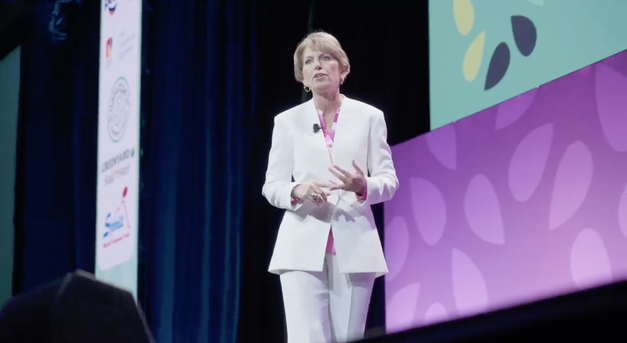Seventy-five years ago, the Anaheim region in California was filled with orange trees as far as one could see. Walt Disney transformed the region as well as the childhood lives of many people by building Disneyland California. That’s what the city of Anaheim is best known for today, Cathy Burns recalled yesterday morning during the kick-off of IFPA’s Global Produce & Floral Show in Anaheim. “How do you see the fresh produce world 75 years from now,” she asked. “When looking at the state of the industry, we are doing okay, but there are improvements to be made. The state of the world, however, isn’t so hopeful as we are grappling with challenges in many parts of the globe.”

Cathy Burns during the opening of the IFPA Global Produce & Floral Show.
Good news
Burns broke her presentation down into three sections: good news, bad news, and news she is not sure about. “The good news is that the industry knows how to invent itself from within.” She mentioned how artificial intelligence has developed at a rapid pace and brought up examples of recent developments in the fresh produce industry globally. Dutch company One Third developed an optical scanner for store customers to test the ripeness of avocados. In Japan, several 7-Eleven stores scan palms to check if customers are eating their veggies and produce prescription programs that could prevent 296,000 cases of cardiovascular disease in the United States. All examples offer opportunities to grow fresh produce consumption and prevent produce from going to waste. Currently, 14 percent of all food produced is lost between harvest and retail.
Bad news
According to Burns, one of the biggest hurdles the produce industry is faced with is consumption. “We’ve witnessed some growth in recent years, but we are capable of so much more,” she said. She mentioned an example of how Weight Watchers used to focus on changing lifestyles but is now campaigning with anti-obesity drugs. “For some, it’s easier to turn to pharm than to farm,” she added. One-third of kids in the age group 1 to 5 years don’t eat their daily fruit, and nearly half don’t consume vegetables daily. However, 57 percent of kids consume a sugar beverage daily.
In addition, inflation is of big concern and is, in some cases, pushing consumers away from fruits and vegetables. Extreme weather events are having a big impact everywhere around the world. Within the next seven years, they could force more than 122 million people into hunger and poverty. Following inflation, climate change is the second biggest issue that needs action.
Another concern is that currently, 48 percent of employees and 53 percent of managers report they’re burned out at work. “The reality is when people are burned out, they are less engaged. Low engagement costs the global economy $8.8 trillion,” Burns said.
News?
There’s also news that Burns isn’t sure about. “At first, the hype of new innovations usually outpaces the effectiveness.” While it is a bit early to paint AI as a villain, businesses may struggle with the implementation and implications. Activities that take up a lot of time today may become fully automated. Burns expects AI will have some impact on the agricultural industry but mostly on High Tech, Banking, and Pharma.
“Change starts here. Growing consumption starts here. Changing the world through advocacy starts here. Creating a vibrant future for all starts here,” she said. “It’s the easiest thing in the world to say, ‘Someone ought to fix that.’ We ARE that someone. Yes, it will feel overwhelming at times, but no matter the size, nature, source, or timing of any challenge, action is the answer, always.”
